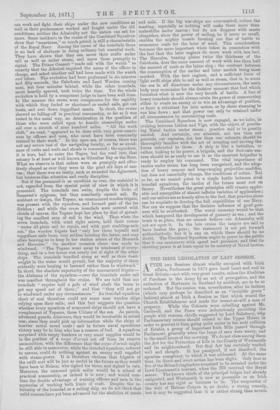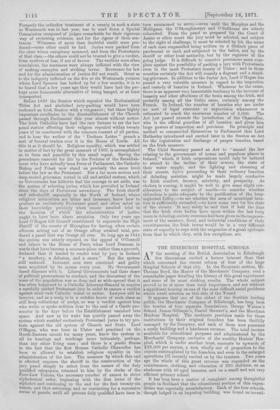THE IRISH LEGISLATION OF LAST SESSION.
AFTER two Sessions almost wholly occupied with Irish affairs, Parliament in 1871 gave itself heart and soul to Great Britain—not with very great results, unless the Abolition of Purchase in the Army by an act of prerogative, and the extinction of Mortmain in Scotland by accident, are to be so reckoned. But the session was, nevertheless, after its fashion (which may perhaps be described as an "invisible green" fashion) almost as Irish a Session as that which erased the Church Establishment and made the tenant-at-will a man of property. While the Colonels were caballing against Mr. Cardwell, and the Peers were industriously providing the people with reasons, chiefly suggested by Lord Salisbury, why Parliamentary reform should extend to the Upper House, in order to prevent it from going quite under in the next collision of Estates, a group of important Irish Bills passed through Parliament, generally when the lungs of men were weary, and in the small hours of the morning. We do not class among them the Act for the Protection of Life in the County of Westmeath and its neighbourhood. But that Act has certainly worked well and cheaply. It has paralyzed, if not dissolved, the agrarian conspiracy, to which it was addressed. At the same time, its direct and overt action has been slight. Only four or five of the Riband ringleaders remained to be arrested under the Lord-Lieutenant's warrant, when the Bill received the Royal assent. The known chiefs of the principal lodges had already emigrated, and Westmeath is now as peaceable as an Irish county has any right or business to be. The -suspension of the writ of Habeas Corpus is, no doubt, a strong remedy, but it may be suggested that it is rather strong than severe.
Formerly the orthodox treatment of a county in such a state as Westmeath was in last year, was to send down a Special Commission composed of judges remarkable for their vigorous way of reviewing evidence, and for the rigour of their sen- tences. Witnesses of more than doubtful credit were pro- duced—none other could be had. Juries were packed from the class whom conspiracy menaced, and from the Protestants of that class,—the others could not be trusted to give a verdict, from motives of fear, if not of favour. The verdicts were often scandalous, the sentences were always inflicted with the view of making examples and striking terror. Reverence for law and for the administration of justice did not result. Great as is the indignity inflicted on the five or six Westmeath yeomen whom Lord Spencer has lacked up for a few months, it is to be feared that a few years ago they would have had the per- haps more honourable alternative of being hanged, or at least transported. Before 1869 the Session which repealed the Ecclesiastical Titles Act and abolished jury-packing would have been reckoned an Irish Session with a vengeance ; but these highly important corollaries to the disestablishment of the Church passed through Parliament this year almost without notice. The Irish Catholics have had the rare fortune to see the last penal statute affecting their religion repealed within twenty years of its enactment with the common consent of all parties, and to hear the author of the "Durham Letter" preach a sort of funeral oration over it in the House of Lords. All this is as it should be. Religious equality, which was settled in matter of fact by the great measure of 1869, is accomplished as to form and punctilio by this small repeal. Saving the precedence reserved for life to the Prelates of the Establish- ment who have actually been Peers of Parliament, the Catholic Bishop and Priest now stand on precisely the same level before the law as the Protestant. But a far more serious and deep-rooted grievance, rooted in old and settled custom, which no Government has hitherto had the courage to set aside, was the system of selecting juries, which has prevailed in Ireland since the days of Protestant ascendancy. The Irish sheriff and sub-sheriff, especially in the North of Ireland, where religious animosities are bitter and incessant, know how to produce an exclusively Protestant panel, and often acted on their knowledge precisely when causes awaited trial in the decision of which the administration of justice ought to have been above suspicion. Only two years ago Lord O'Hagan felt himself constrained to supersede the High Sheriff of the county of Monaghan for having, when certain offences arising out of an Orange affray awaited trial, pro- duced a panel that was Orange all over. So long ago as 1844 the system was utterly exposed, on the appeal of O'Connell and others to the House of Peers, when Lord Denman, in words that have become a common-place rather than a proverb, declared that it tended to render trial by jury in Ireland "a mockery, a delusion, and a snare." But the system still endured. Innocent men were convicted and guilty men acquitted by its means every year. No Government dared dispense with it. Liberal Governments had their share of political prosecutions to conduct, and the discontent of the mass of the population was so deep and so wide-spread that it has often happened to a Catholic Attorney-General to require a carefully packed Protestant jury in order to ensure a verdict against some rash Catholic orator or writer. Lawyers will be lawyers, and as a scalp is to a redskin brave of such clans as still keep collections of scalps, so was a verdict against him who wrote or spoke sedition dear to the soul of a Castle pro- secutor in the days before the Establishment vanished into space. And now in its wake has quietly passed away the system which enabled exclusively Protestant juries to try pro- tests against the old system of Church and State. Lord O'Hagan, who was born in Ulster and practised on the North-Eastern circuit for many years, knew the system in all its bearings and workings more intimately, perhaps, than any other living man ; and there is a poetic fitness in the fact that the first Roman Catholic Chancellor has been so allowed to establish religious equality in the administration of the law. The measure by which this end is effected requires the sheriff in the construction of the jury panel simply to select from the names of the duly qualified ratepayers, returned to him by the clerks of the Poor-Law Unions, the necessary number of names in strict alphabetical order, beginning with the first letter of the alphabet and continuing to the end for the first twenty-six flames, and then returning, and so continuing for a successive series of panels, until all persons duly qualified have been in turn summoned to serve,—even until the Murphya and the Mulligans, the O'Shaughnessys and O'Sullivans are utterly exhausted. From the panel so prepared for the Court of Assize or other court the jury must be selected, and subject to the right of challenge, it must be selected by lot, the name of each man empanelled being written on a distinct piece of parchment or card, and subjected to the ballot, not by the sheriff or other local authority, but by the registrar of the going judge. It is difficult to conceive provisions more com- plete against the possibility of packing a jury with Protestants even in the most Protestant county of Ulster ; and in those counties certainly the Act will remedy a flagrant and a stand- ing grievance. In addition to the Juries' Act, Lord O'Hagan has passed a very valuable measure in regard to the inspection and. custody of lunatics in Ireland. Whatever be the cause, there is an apparent very lamentable tendency to the increase of insanity and other affections of the brain among the Irish, and probably among all the Celtic races, certainly among the French. In Ireland, the number of lunatics who are under no sort of legal restraint or supervision whatsoever is estimated to reach the enormous number of 6,000. The Act just passed extends the jurisdiction of the Chancellor, who is the official guardian of all lunatics, and gives him large powers of inspection and provision. Its principle and method so commended themselves to Parliament that Lord Hatherley introduced and carried later in the Session an Act for the registration and discharge of pauper lunatics, based on the Irish measure.
The Chief Secretary passed an Act to "amend the law relating to the government of towns and populous places in Ireland," which, if Irish corporations could only be induced to attend to the incline of their sewers, the state of their water supply, and the lighting and cleansing of their streets, before proceeding to their ordinary function of debating societies, might be made largely conducive to Irish comfort, decency, salubrity, and prosperity. As cholera is coining, it might be well to give some slight con- sideration to the subject of smells—to consider whether chloralum is quite adequate to the purification of the long- neglected Liffey,—to see whether the area of municipal taxa- tion is sufficiently extended,—to have some care for the state of the streets. It may safely be said that if half the time that the Irish civic bodies have spent within the last forty years in debating-society exercises had been given to the improve- ment of the sanatory, fiscal, and industrial conditions of their constituencies, the Irish towns would be in a very different state of capacity to cope with the exigencies of a great epidemic from that in which they, with few exceptions, are.































 Previous page
Previous page